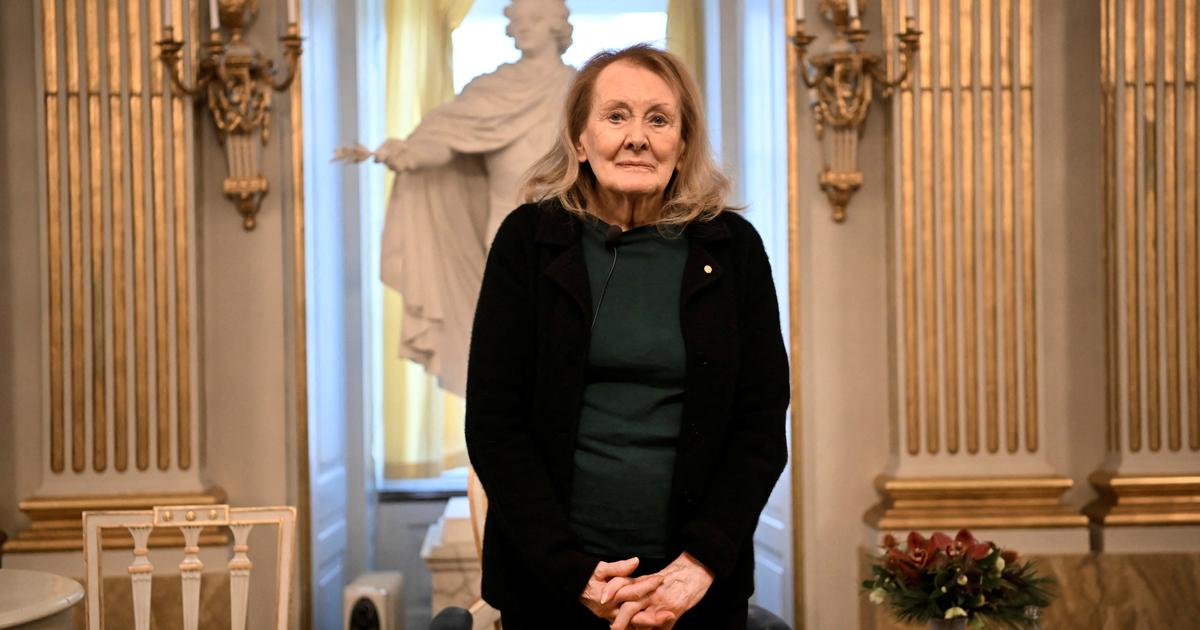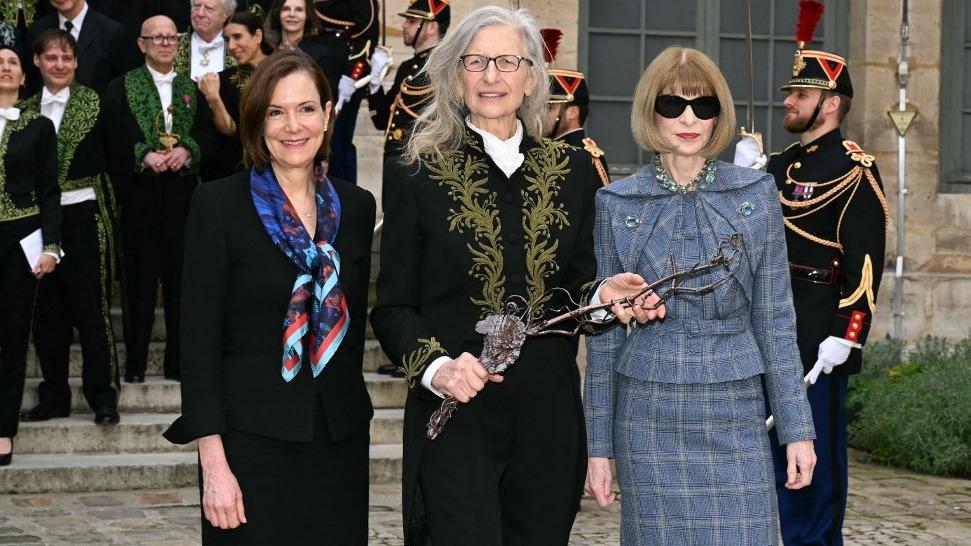In Cergy, it was in her kitchen, on the radio, that she learned that she was Nobel in literature, the first French woman to receive it.
And promised, from this announcement, that she would continue her fight against injustice.
A fight that she evokes in a speech.
Annie Ernaux explains her reason for writing and as always her need for her,
an "immigrant from within"
as she defines herself, to carry with her words the revenge of the downgraded.
A revenge for his parents, these being "
hard at tasks that made them die early
".
From them, she believes that she
"received enough strength and anger to have the desire and the ambition to make a place for her in literature"
.
Read alsoThe Nobel is an institution "for men", according to Annie Ernaux
Speech by Annie Ernaux at the Nobel Academy
Where to start ? This question, I asked myself dozens of times in front of the blank page. As if I had to find the sentence, the only one, which will allow me to enter the writing of the book and will remove all doubts all at once. A kind of key. Today, to face a situation that, past the stupor of the event –
“is this really happening to me?”
– my imagination presents me with growing dread, it is the same necessity that overwhelms me.
Find the sentence that will give me the freedom and the firmness to speak without trembling, in this place where you invite me this evening.
This sentence, I do not need to look for it far. She arises. In all its sharpness, its violence. Lapidary. Irrefutable. It was written sixty years ago in my diary.
“I will write to avenge my race.”
She echoed Rimbaud's cry:
"I am of an inferior race from all eternity."
I was twenty-two.
I was a student in Letters in a provincial faculty, among girls and boys for many from the local bourgeoisie.
I proudly and naively thought that writing books, becoming a writer, at the end of a line of landless peasants, workers and petty traders, people despised for their manners, their accent, their lack of culture, would be enough to repair the social injustice from birth. That an individual victory erased centuries of domination and poverty, in an illusion that the School had already fostered in me with my academic success. How could my personal achievement have redeemed anything from the humiliations and offenses suffered? I didn't ask myself the question. I had a few excuses.
The possibility of transfiguring reality
Since I could read, books were my companions, reading my natural occupation outside of school. This taste was maintained by a mother, herself a great reader of novels between two customers of her shop, who preferred me reading rather than sewing and knitting. The high cost of books, the suspicion they held in my religious school, made them even more desirable to me.
Don Quixote, Gulliver's Travels, Jane Eyre,
Grimm and Andersen tales,
David Copperfield, Gone with the Wind,
later
Les Miserables, The Grapes of Wrath, Nausea, The Stranger
: It's Chance , more than prescriptions from the School, which determined my reading.
The choice to study literature had been to stay in literature, which had become the superior value to all the others, a very way of life that made me project myself into a novel by Flaubert or Virginia Woolf and to live them literally. . A kind of continent that I unconsciously opposed to my social environment. And I only conceived of writing as the possibility of transfiguring reality.
It wasn't the refusal of a first novel by two or three publishers – a novel whose only merit was the search for a new form – that lowered my desire and my pride. These are life situations where being a woman weighed heavily in difference from being a man in a society where gender roles were defined, contraception prohibited and termination of pregnancy a crime. In a relationship with two children, a teaching profession, and the burden of family stewardship, I was moving further and further away each day from writing and from my promise to avenge my race. I couldn't read
"The Parable of the Law"
in
The Trial
of Kafka without seeing in it the figuration of my destiny: to die without having crossed the door which was made only for me, the book that only I could write.
But that was without counting on private and historical chance. The death of a father who dies three days after I arrived home on vacation, a job as a teacher in classes whose students come from popular backgrounds similar to mine, global protest movements: so many elements that brought me back by ways that were unforeseen and sensitive to the world of my origins, to my "race", and which gave my desire to write a character of secret and absolute urgency. It was not a question, this time, of indulging in this illusory "writing on nothing" of my twenties, but of plunging into the unspeakable of a repressed memory and bringing to light the way of existing of my people. . Writing in order to understand the reasons inside and outside of me that had taken me away from my origins.
Models of works admired
No writing choice is self-evident. But those who, immigrants, no longer speak the language of their parents, and those, defectors of social class, no longer have quite the same one, think and express themselves with other words, all are faced with additional hurdles. A dilemma. They feel, in fact, the difficulty, even the impossibility of writing in the acquired, dominant language, which they have learned to master and which they admire in its literary works, everything that relates to their world of origin, this first world is made of sensations, of words that describe daily life, work, the place occupied in society. On the one hand, there is the language in which they have learned to name things, with its brutality, with its silences, that, for example, of the face-to-face meeting between a mother and a son,
Between yes and no.
On the other, the models of admired, internalized works, those which opened up the first universe and to which they feel indebted for their elevation, which they often even consider as their true homeland. In mine were Flaubert, Proust, Virginia Woolf: when it came time to resume writing, they were of no help to me. I had to break with "writing well", the beautiful phrase, the very one that I taught my students, to root out, exhibit and understand the tear that was going through me. Spontaneously, it is the din of a language carrying anger and derision, even rudeness, that came to me, a language of excess, insurgent, often used by the humiliated and the offended, as the only way to respond to the memory of contempt, shame and the shame of shame.
Very quickly too, it seemed obvious to me – to the point of not being able to envisage any other starting point – to anchor the story of my social tear in the situation that had been mine when I was a student, the revolting , to which the French State always condemned women, the recourse to clandestine abortion in the hands of an angel maker. And I wanted to describe everything that happened to my girl's body, the discovery of pleasure, the rules. Thus, in this first book, published in 1974, without my being aware of it then, was defined the area in which I would place my writing work, an area that was both social and feminist. To avenge my race and to avenge my sex would henceforth be one.
How not to wonder about life without also doing so about writing? Without wondering if this reinforces or disturbs the accepted, interiorized representations of beings and things? Didn't the insurgent writing, by its violence and derision, reflect a dominated attitude? When the reader was a cultural privileged person, he maintained the same position of overhang and condescension with respect to the character of the book as in real life. It was therefore, originally, to thwart this gaze which, cast on my father whose life I wanted to tell, would have been unbearable and, I felt, a betrayal, that I adopted, from my fourth book, a neutral, objective writing, "flat" in the sense that it contained neither metaphors nor signs of emotion. Violence does was more exhibited, it came from the facts themselves and not from the writing. Finding the words that contain both reality and the sensation provided by reality was to become, until today, my constant concern in writing, whatever the subject.
Continuing to say "I" was necessary for me. The first person – the one by which, in most languages, we exist, from the moment we know how to speak, until death – is often considered, in its literary use, as narcissistic when it refers to the author. , that it is not an "I" presented as fictitious. It is worth remembering that the "I", hitherto the privilege of nobles recounting high feats of arms in memoirs, was in France a democratic conquest of the 18th century, the affirmation of the equality of individuals and of the right to be the subject of their history, as claimed by Jean-Jacques Rousseau in this first preamble to the
Confessions
:
“And let no one object that, being only a man of the people, I have nothing to say that deserves the attention of readers.
[…] In whatever obscurity I may have lived, if I thought more and better than the Kings, the story of my soul is more interesting than that of theirs.”
It was not this plebeian pride that motivated me (although…) but the desire to use the “I” – form both masculine and feminine – as an exploratory tool that captures sensations, those that memory has buried , those that the world around keeps giving us, everywhere and all the time. This prerequisite of sensation has become for me both the guide and the guarantee of the authenticity of my research. But for what purpose? For me, it is not a question of telling the story of my life nor of freeing myself from its secrets, but of deciphering a situation experienced, an event, a romantic relationship, and thus revealing something that only writing can make exist. and pass, perhaps, into other consciousnesses, other memories. Who could say that love, pain and mourning, shame, are not universal? Victor Hugo wrote:
“None of us has the honor of having a life of our own.”
But all things being experienced inexorably in the individual mode – "it happens to me" - they can only be read in the same way, if the "I" of the book becomes, in a certain way, transparent, and let that of the reader come to occupy it.
That this I is in short transpersonal.
This is how I conceived my commitment to writing, which does not consist in writing "for" a category of readers, but "from" my experience as a woman and an immigrant from the interior, from my memory henceforth more and more long of the years crossed, since the present, ceaselessly purveyor of images and words of the others. This commitment as a pledge of myself in writing is supported by the belief, which has become certain, that a book can contribute to changing personal life, to breaking the loneliness of things suffered and buried, to thinking differently. When the unspeakable comes to light, it's political.
We see it today with the revolt of these women who have found the words to upset male power and have risen up, as in Iran, against its most archaic form. Writing in a democratic country, I continue to wonder, however, about the place occupied by women in the literary field. Their legitimacy to produce works is not yet acquired. There are men in the world, including in Western intellectual spheres, for whom books written by women simply do not exist, they never cite them. The recognition of my work by the Swedish Academy is a beacon of hope for all female writers.
In the bringing to light of the social inexpressible, this internalization of the relations of class and/or racial domination, also of sex, which is felt only by those who are its object, there is the possibility of a individual but also collective emancipation. To decipher the real world by stripping it of the visions and values that language, any language, carries, is to disturb the established order, upset the hierarchies.
But I don't confuse this political action of literary writing, subject to its reception by the reader, with the positions that I feel compelled to take in relation to events, conflicts and ideas. I grew up in the post-war generation where it was obvious that writers and intellectuals position themselves in relation to French politics and get involved in social struggles. Nobody can say today if things would have turned out differently without their words and their commitment. In today's world, where the multiplicity of sources of information, the speed with which images are replaced by others, accustom to a form of indifference, concentrating on one's art is a temptation. But, at the same time, there is in Europe – still masked by the violence of an imperialist war waged by the dictator at the head of Russia – the rise of an ideology of withdrawal and closure, which is spreading and continuously gaining ground in countries so far democratic. Founded on the exclusion of foreigners and immigrants, the abandonment of the economically weak, on the surveillance of women's bodies, it imposes me, on me, as on all those for whom the value of a human being is the same , always and everywhere, a duty of extreme vigilance.
An individual victory
By granting me the highest literary distinction there is, it is a work of writing and a personal research carried out in solitude and doubt that are placed in a great light. She doesn't dazzle me. I do not regard the awarding of the Nobel Prize to me as an individual victory. It is neither pride nor modesty to think that it is, in some way, a collective victory. I share the pride of it with those who, in one way or another, wish for more freedom, equality and dignity for all humans, regardless of their sex and gender, their skin and their culture. Those who think of the generations to come, of safeguarding an Earth that the appetite for profit
If I look back on the promise made at twenty to avenge my race, I cannot say whether I have carried it out. It was from her, from my ancestors, hard men and women with tasks that caused them to die early, that I received enough strength and anger to have the desire and the ambition to make room for her in literature, in this set of multiple voices which, very early on, accompanied me by giving me access to other worlds and other thoughts, including that of rebelling against it and wanting to modify it. To register my voice as a woman and as a social defector in what always presents itself as a place of emancipation, literature.


/cloudfront-eu-central-1.images.arcpublishing.com/prisa/4CMOJWD7RNHHPJD5UVCNRMMLYM.jpg)






